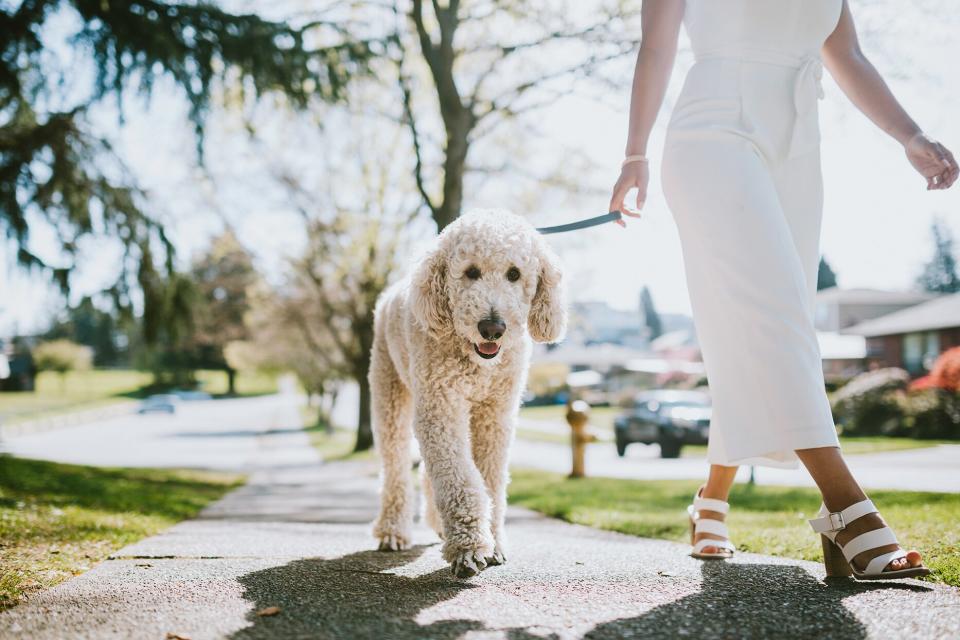The Ultimate Care Guide for Every Poodle Owner
Poodles are excellent dogs for a variety of reasons. If you're currently in the adoption process, you should know all about your future pet. (And if you already own one, it's important to refresh yourself on the breed.) There are three types of poodles, according to the American Kennel Club: the standard poodle and the miniature poodle, and the toy poodle. The first thing you should consider before adopting is your living space. If you live in a house with a big yard for your poodle to explore, a standard would be a great option. For the apartment dwellers, a miniature or toy is probably best for you. (Or, if you just like smaller dogs, the miniature or toy is also a perfect choice.) No matter which one you decide on, they'll make a great pet as they're very smart and are wonderful companions. They're also hypoallergenic, which is a huge bonus. (It's the reason you probably see mixes with poodles, such as Goldendoodles, Bernadoodles, and Labradoodles.) Once you decide on the best poodle for you, you'll need to know how to care for them properly.

RyanJLane/Getty Images
How to Care for Your Poodle
After you've adopted your dog and given them a name, you need a primer on your pup's characteristics, grooming needs, and food preferences. Here's everything you need to know about your fluffy pup.
Temperament: Poodles are proud and smart. Combine these personality traits with a poodle's looks, and one can easily see why many feel the poodle has an air of distinction and dignity.
Training: Poodles are very intelligent, which should make training relatively easy. Basic obedience training is recommended for all poodles. However, poodles also enjoy various other trained activities, including tracking, hunting, and agility.
Care and Grooming: Poodles are a non-shedding breed, making them a great choice for people with allergies. Although non-shedding, poodles require regular grooming. A poodle's coat is curly and dense, and it needs to be brushed with a proper comb, like the Safari De-Matting Dog Comb ($13, Chewy), weekly. Poodles also need their coat trimmed once every three to six weeks. Most owners want their poodles to look elegant and properly clipped. Therefore, many owners take their poodle to a professional groomer. These appointments can become expensive, so be sure to keep this in mind when calculating the cost of owning a poodle. As far as exercise, poodles are very active and want to keep busy, so it is important to ensure your poodle receives daily exercise.
Health: Poodles are generally a healthy breed. Its lifespan depends on its size, but most poodles live into their teenage years. However, like all purebreds, there may be some health issues, like hip dysplasia, progressive retinal atrophy, cataracts, idiopathic epilepsy, and sebaceous adenitis von Willebrand disease, and immune-mediated disorders, including disorders of the thyroid and adrenal glands. Poodles can also suffer from orthopedic problems, gastric dilation with volvulus (bloat), sebaceous adenitis, and autoimmune disorders. These issues can be minimized by working with a responsible breeder who knows the breed's specific health concerns and diseases.
Food: Good nutrition, including proper food, is critical throughout a poodle's life. As you know now, poodles come in three varieties: small (toy), medium (miniature), and large standard. From the highest point of their shoulders, the toy poodle's size is usually 10 inches or less. The miniature poodle's size is usually between 10 and 15 inches, and the standard poodle is over 15 inches. Male standard poodles usually weigh between 45 and 70 pounds, while female standard poodles typically weigh between 45 and 60 pounds.
In contrast, toy poodles are much smaller and weigh between 15 and 17 pounds. Depending on your poodle's size, consider working with your veterinarian to determine the best diet to ensure your pet remains healthy. You can try dog-specific food such as the Royal Canin Poodle Adult Dry Dog Food ($40, Chewy).

